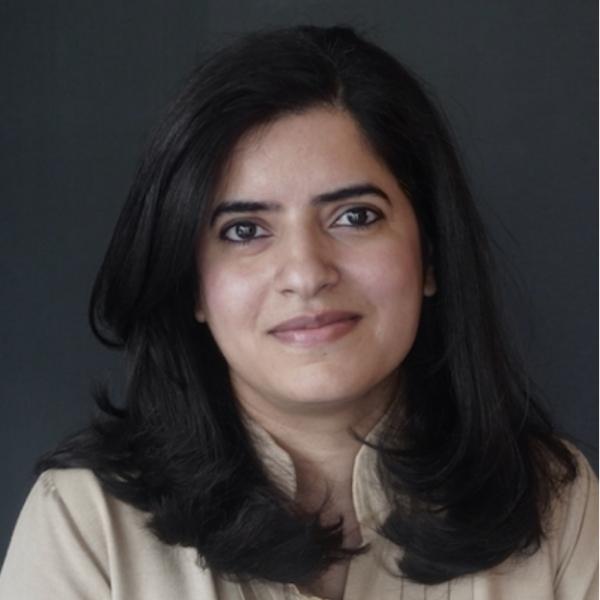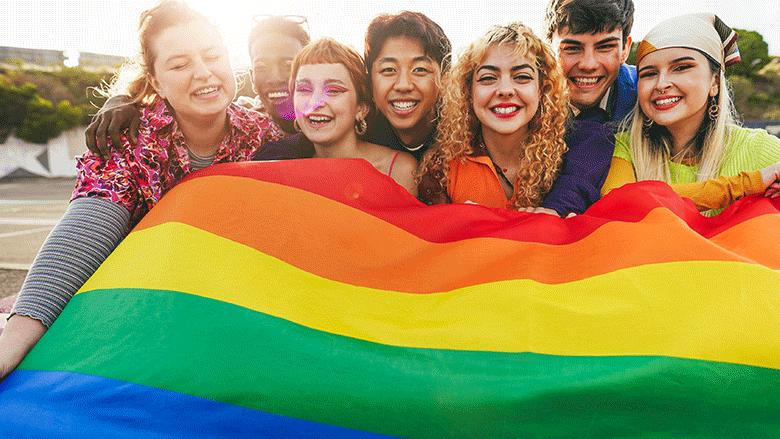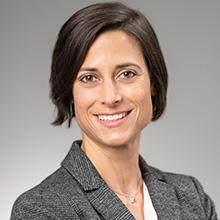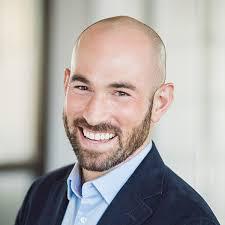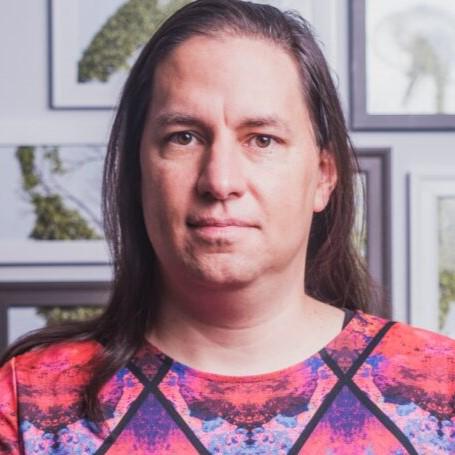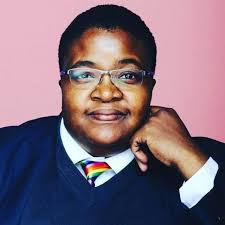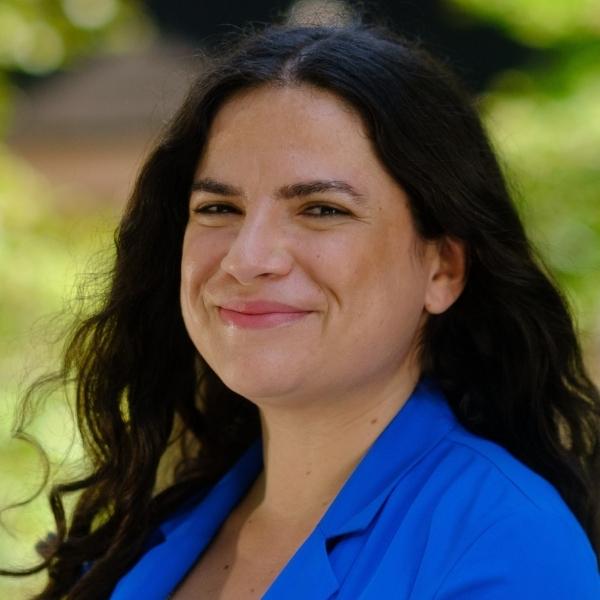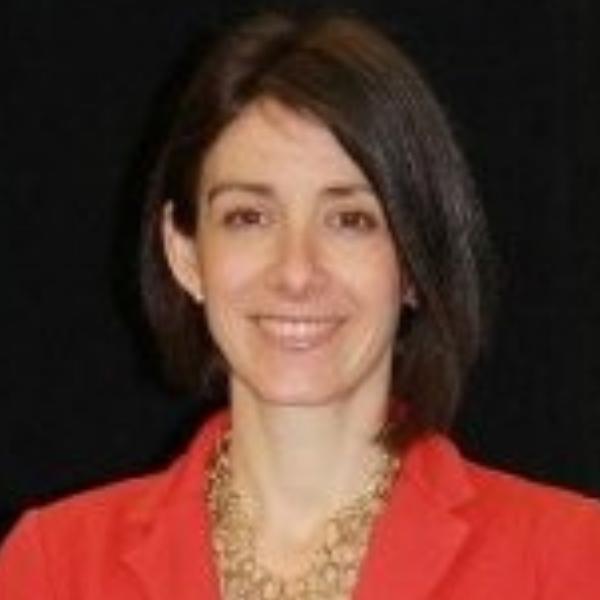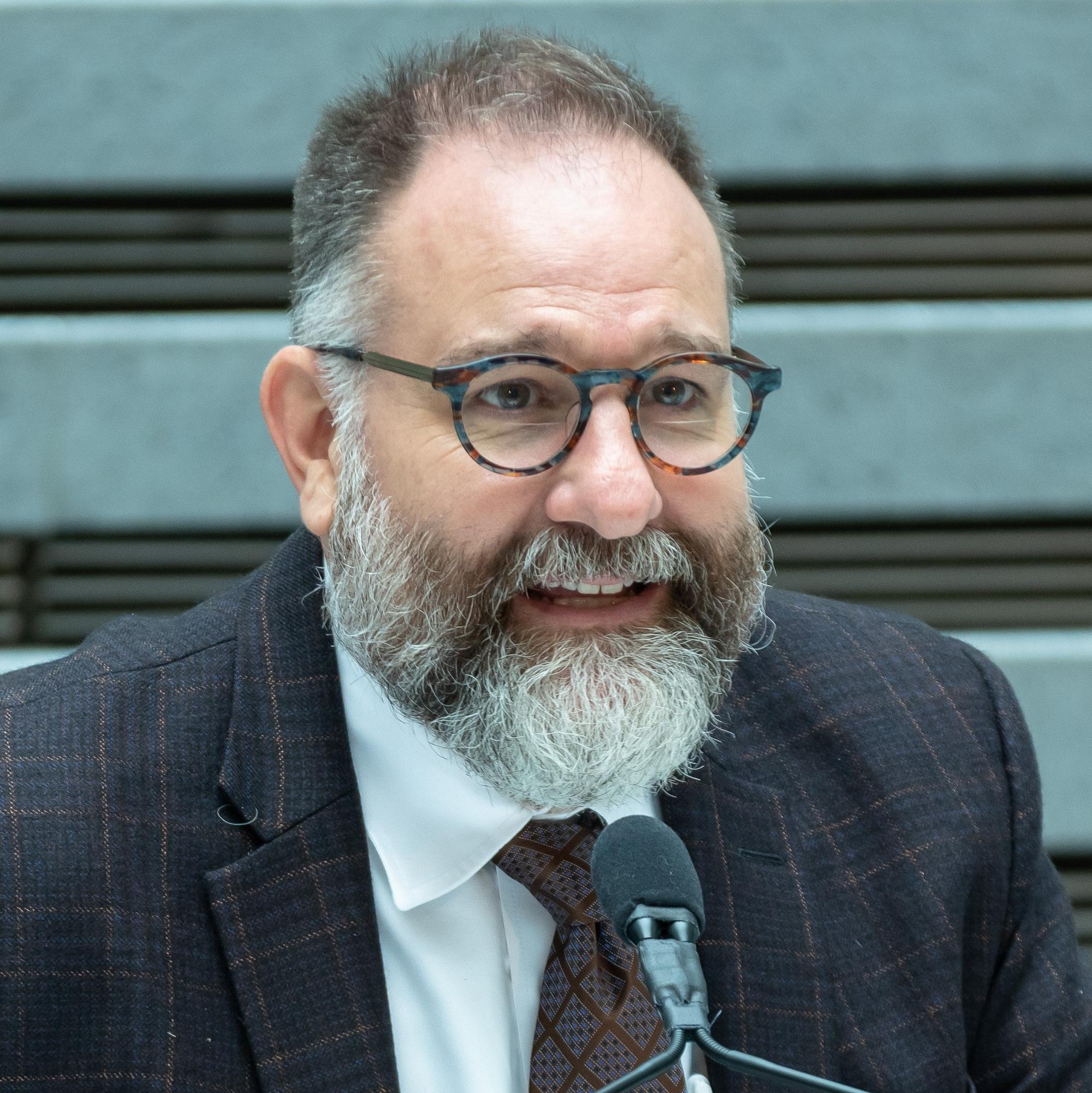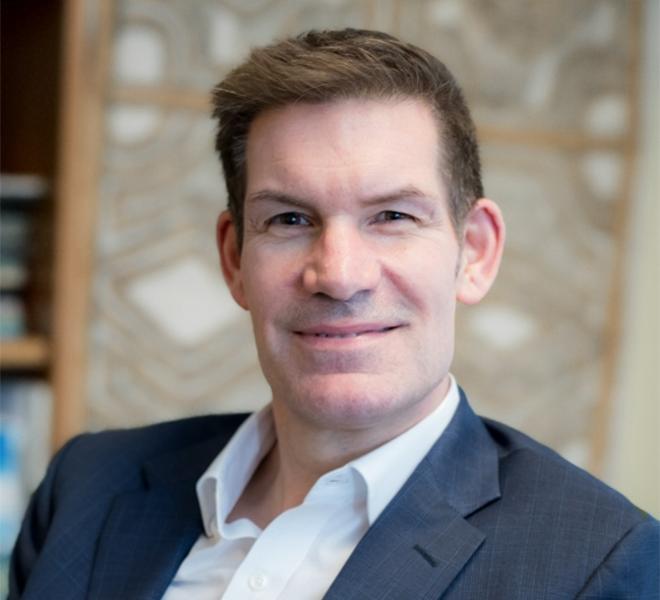[Robin Mearns] Hello, and welcome to our event on the Law and Inclusive Development, launching the second edition of the Equality of Opportunity for Sexual and Gender Minorities report, or “EQOSOGI,” for short. I'm Robin Mearns, Global Director for Social Sustainability and Inclusion at the World Bank, and the moderator of today's event. We're delighted to have people joining us from across the globe. We're broadcasting today's event in English, Spanish, French, Portuguese, and Arabic. Please, click on the interpretation icon at the bottom of your screen to choose your preferred language. Also, please note that today's session is being recorded, and the recording will also be made available in all interpreted languages. We would love for you to engage with us via a quick poll available in front of you on the World Bank Live page by answering the question, in your view, to which three topics are inclusive legal frameworks the most relevant? The EQOSOGI series provides an important foundation for advancing inclusive development in documenting the current state of laws, regulations, and policies that either promote inclusion or discriminate against people based on sexual orientation, gender identity and expression, and sex characteristics. Today, we're launching the second edition of the report, which expands the original analysis of 16 countries in 2021 to 64 countries, and looks at correlations with development indicators for the first time. We have an exciting lineup of speakers for today's event. To get things started, it's my great pleasure to introduce Antonia Orellana, a highly effective advocate for equality, and the current Minister of Women and Gender Equity of Chile, joining us today to provide opening remarks. Over to you, Honorable Minister.
[Antonia Orellana] [Speaking in Spanish]. Good morning to all, it is a great honor to be here representing the Ministry of Chile on the Equality of Women in my country. I want to highlight the pertinence of the commitment of our government with a robust agenda for equality and inclusion. We know that to make progress for a fairer society, we need to develop specific policies and programs that respond to the needs of groups that require protection. In Chile, this is a central commitment of our Ministry to look for gender equality in the broadest possible sense of the word, not leaving anyone behind. A concrete example of the commitment of the government is the program of the Ministry of Health, “Growing Up Proudly.” This is psychosocial [program] directed at children, and young adults, and adolescents that have gender nonconformity realities. We are focused on those under 18, focusing political… Really tackling political resistance and media resistance. We have been able to support more than 1,000 children and adolescents throughout the country. This type of program is not only responding to a social need, but it's also responding to a conviction that inclusion is a fundamental pillar to development. I also would like to thank you for including our country in this second report of the World Bank. In Chile, due to very recent surveys, we have corroborated that the LGBT community is not a minority, as it is assumed a lot of the time. From 2023, 3.4% of the population over 18 years of age have a different orientation other than heterosexuality, and 1.1% report a different gender identity than the sex assigned at birth. This has increased when we include the young people. In 2022, 12% of young people between 15 and 29 did not identify as heterosexual. If you include this to the question of gender identity in our population census of this year, we have been able to start a characterization process of the LGBTIQ+ community through our Institute of Statistics, which is autonomous and independent, a fundamental step to be able to continue making progress in public policy towards equality of opportunities. I would like to conclude by reiterating our thanks to the World Bank to carry out this type of report that allows us to include these communities like LGTBIQ+. In all our public policy, we want to continue collaborating with you and the different countries that work on these topics in future initiatives to keep making progress. Thank you very much.
[Robin Mearns] Thank you so much, Honorable Minister. I would I'd now like to invite Patricia Peña, Associate Assistant Deputy Minister of International Assistance, Partnerships and Programming at Global Affairs Canada, to also share her opening remarks. Over to you, Patricia.
[Patricia Peña] Honorable guests, colleagues, partners, and friends, please allow me to begin by acknowledging that I am speaking with you from the traditional unseated territory of the Algonquin Anishinaabe people in Ottawa, Canada. Canada is on a journey of reconciliation with indigenous peoples, and acknowledging the first peoples of this land is part of this undertaking. [Speaking in French]. We have been working steadfastly to strengthen the inclusion of the LGBTI+ communities in our international assistance through our new partnerships. An important part of this commitment is our support for the World Bank's Social Sustainability and Inclusion for All Trust Fund. Today's launch of the second edition of the Bank's Equality of Opportunity for Sexual and Gender Minorities report marks one of the key achievements of this partnership, and one of which we are very proud. The EQOSOGI Report is groundbreaking and essential in that it shows very clearly the social and economic costs of exclusion. This second edition expands the number of countries reviewed from 16 to 64. It helps demonstrate the critical role laws and policies play in perpetuating discrimination. It also underlines good practices and recommendations for the reforms to ensure that all people, especially LGBTQI+ people, can share more equitably in development outcomes. We know that today, this is more important than ever. [Speaking in French]. Through the EQOSOGI report, we have a closer look at what equality of opportunity for sexual and gender minorities means within a policy framework. How improved access to education and labor markets can help expand economic opportunities for LGBTQI+ people and strengthen a country's productivity. How addressing the disparities that LGBTQI+ communities face in accessing services and social protection can strengthen the foundation for their full participation in social and economic life. How civil and political inclusion of LGBTQI+ people allows their voices to be heard, strengthens their ability to influence the decisions that affect their lives, and enhances their feeling of belonging, contributing to greater social sustainability and inclusion. How supportive regulatory frameworks for equality, including legal safeguards that protect LGBTQI+ people from violence and hate crimes, helps to address the marginalization that can force them into poverty and compound exclusion, and taken together, how these measures benefit societies at large. For all of us, government, international organizations, and civil society alike, the EQOSOGI report provides an important roadmap for progress towards a more inclusive, prosperous, and resilient societies. Canada is proud to stand alongside you in these efforts, and we look forward to continuing the work ahead. Thank you.
[Robin Mearns] Thank you very much, Patricia. I'd now like to invite one of the report authors and the co-lead of the team that produced the report, Julia Braunmiller, to present the key findings of the report. Over to you, Julia.
[Julia Constanze Braunmiller] Good morning. Thank you everyone for joining. Thank you for showing up as allies, as members of the community. I'm so happy to present to you now the key findings of the EQOSOGI report. One moment while my screen is coming up. Let's start with what lies at the core of the EQOSOGI initiative. That's the idea that discrimination against sexual and gender minorities has a negative impact not only on their well-being, but also on their ability to contribute to the economy and hence, development outcomes. Ensuring their inclusion, of course, starts with an inclusive legal and policy environment. That's where we start, with the legal environment, because the written law is what we can measure and also what we can change. A change in laws can then influence a change in social norms over time. Overall, in the EQOSOGI second initiative, we have 138 questions on laws, regulations, and policies. Those questions are spread over six topics of what we call indicator sets. It ranges from decriminalization to equal access to labor markets, education, and protection from hate crimes. We also disaggregate our data into three groups. Then we have different results for laws on sexual orientation, on gender identity and expression, and on sex characteristics. We then use our legal data to create an index with country scores. This numerical data can then be used to analyze how laws relate to economic development indicators, including wealth, human capital, and voice and accountability. This is not a new approach. In fact, it builds on another very successful World Bank initiative, the Women, Business, and the Law Project, which has for 15 years been providing evidence on the economic importance of legal reforms for gender equality. As you've already heard, this year, we expanded from the first pilot report that was published in 2021 with 16 countries to now 64 countries. We choose these countries in a holistic manner. They represent various regions, income levels, population sizes, legal traditions, and levels of inclusiveness. Our report then provides an updated data on the 16 countries from the first report that includes, for example, Bangladesh, Costa Rica, India, Lebanon, South Africa, and Ukraine. The World Bank team then led data collection for an additional 31 countries. We were also joined and supported by the Asian Development, who collected data across 70 countries in Asia. Here, I really, really want to thank the EQOSOGI team for their incredibly hard work and dedication over the past two years. Since February 2023, they have sent out standardized questionnaires to lawyers and academics, civil society, representatives, and advocates on SOGIESC issues in 64 countries. As you can see, the team is a diverse team of lawyers that are trained in various legal systems and speak many different languages. We are also supported by economists and data scientists who did the economic analysis. These team members have collaborated with over 350 local experts in 64 countries. Without the wonderful pro-bono expertise of these people, the work would not have been possible. Some of our experts are listed in the report, and others preferred to stay anonymous to ensure their safety, but I do hope you're all able to join right now and hear this huge thank you from me and from the team. Let's dive into some of our global findings. First, here, let's look at the overall scores by indicator set and by region. Note that the scores reflect the presence or the absence of legal, regulatory, and policy frameworks across the six topics that we measure. What we find overall across the 64 countries is the average score is 0.31, and that is out of a one as a top score. You may have expected this. It's quite a low score that shows us much room for improvement and need for reform. More than half of the countries that we assess have a low presence of frameworks favoring equality of opportunity for sexual and gender minorities. You can see that regionally, low scores are prevalent in East Asia and the Pacific, in the Middle East and North Africa, South Asia, and sub-Saharan Africa. Only three countries have a high presence of inclusive frameworks, and those are Canada, France, and Spain. If we look at the six topics that we measure, although decriminalization has a considerably high score, many countries continue to criminalize same-sex behavior. Protection from hate crimes, on the other hand, exhibits the lowest average score, highlighting an urgent need for improvement. As mentioned, you can find many good examples in the report that can then guide reforms in other countries. Looking at income levels, we also have some interesting findings showing that wealthier countries tend to be more inclusive of sexual and gender minorities. Here we found a statistically significant positive correlation between per capita real gross domestic product and overall EQOSOGI scores. We're certainly not establishing causality here with our research, but the findings do suggest that economic prosperity is associated with greater inclusion of sexual and gender minorities. Higher levels of human capital and citizens' voice and accountability are also correlated with more inclusive environments. Then when we look at the distribution of the three categories, that is lesbian, gay, and bisexual people, transgender people, and intersex people, we also find an interesting regional distribution. Particularly, the intersex community faces many disparities. Then in the report, we identify six areas for policy engagement, and this includes the need for data collection and analysis, and various areas of legal reform. I will now give you three concrete examples of what this can look like. First, what we find is that 23 countries analyzed in the EQOSOGI report, criminalized SOGIESC behavior and expression. That is, 22 countries that criminalize same-sex sexual activities between consenting adults. Eight countries criminalize gender expression and identity. Several countries also have laws against vagrancy or public morals that then indirectly target sexual and gender minorities. Notably, no country explicitly criminalizes intersex people; but this means that 1.3 billion people live in the 64 countries measured by EQOSOGI that criminalize same-sex sexual activity or gender expression. When laws punish people for who they are, or for who they love, it prevents them from reaching their full potential; but not only does this harm to them personally, it also means they cannot contribute to their communities. Research shows us that decriminalization leads to lower rates of violence and assault, and it can positively affect drivers of economic development like access to education, health, and decent work. I encourage you to learn about recent reforms in our report from countries that have decriminalized same-sex sexual activities over the past years. Studies conducted worldwide reveal also that sexual and gender minorities experience discrimination during all stages of their employment, from recruitment to career growth opportunities, and they report facing harassment and bullying because of their sexual orientation or gender identity while at work. The law can be a powerful tool to combat discrimination. 44% of the countries that we measured prohibit discrimination in employment on one or more SOGIESC grounds. We have found good practice examples from many different countries. For example, Ecuador prohibits unequal treatment in the recruitment process for sexual and gender minorities. Mongolia prohibits unfair dismissal of an employee based on their sexual orientation or gender identity. Norway prohibits employees from asking questions about SOGIESC. South Africa prescribes equal remuneration regardless of sexual orientation. As a third example, we encourage legal gender recognition based on self-identification. Effective personal identification systems are a vital element to participate in social-economic life and to access government benefits. But what we see is that after 64 countries analyzed, only 27 allow an individual to obtain a new ID card or passport after gender reassignment. In just about half of these countries, allow legal gender recognition on a self-identification basis, meaning they do not require surgeries or lengthy administrative processes. A good example here is Pakistan's Transgender Persons Protection of Rights Act that provides for gender recognition on a self-identification basis. Then we have data that ID cards in 11 countries and passports in 10 countries offer gender markers beyond the binaries of male and female. For example, Nepal allows a third gender category of “other.” Argentina, Brazil, and Mexico provide an ex-gender marker on both ID cards and passports. In addition to our report, we also have other tools that you can explore and learn how to use our data in your work. This is the EQOSOGI dashboard that breaks down all 138 questions that we assessed by country and group, and then allows you to compare them amongst each other. What gets measured can get changed. I invite you now to download the report and the data set and look at the dashboard and then see what needs to change and also find examples how to do it. No country can achieve its full potential when it excludes a part of its population, and it's up to us to remove barriers and provide an environment where everyone, including LGBTI people, can thrive. Thank you.
[Robin Mearns] Thank you very Julia, for that great overview of the report. Now, we'll turn now to our group of distinguished panelists. We're very lucky to have three excellent panelists with us today. They are, first, Julia Ehrt, Executive Director of the International Lesbian, Gay, Bisexual, Trans, and Intersex Association, or ILGA World, based in Geneva, Switzerland. Second, we have Ari Shaw, a Senior Fellow and Director of International Programs at The Williams Institute at UCLA, University of California, Los Angeles. And third and finally, we have Paola Ballon, Senior Economist in Social Sustainability and Inclusion, Global Practice at the World Bank. Let me begin with you, Julia, if I may. Julia, the report analyzes the laws and regulations of countries representing diverse socioeconomic political and geographic contexts. How are LGBTI+ CSOs overcoming the barriers to generating data in more SOGI restrictive countries?
[Julia Ehrt] Thank you, Robin, for that question. And thank you for the World Bank to inviting me to this important launch. It's a pleasure to be here today. Robin, before I answer your question on how LGBTI communities overcome the barriers to data gathering, let me give you a glimpse of what those barriers are and why it is so important to overcome said barriers. So, let's start at the end. Why is it actually important? I think Julia just said, “what gets measured can get changed.” So, in a certain way that says knowing is the basis for change. And I think it's the basis for change in multiple ways. One, knowing the situation has to be the starting point of changing laws, policies, and the hearts and minds eventually. Well, you can't change the law if you do not know the law. Same goes for policies, and in fact, same goes for winning over hearts and minds. Any advocacy starts with knowing the situation. So then, in order to instigate change, you have to build a, we would argue, a usually community-based understanding where you want to go, i.e. what type of change you want the situation into. So, knowing the possibilities can be key. What's the situation in other countries, for example? What could function as good practice models? What has worked elsewhere in other countries? Countries, in other settings, in other regions. So, knowing the situation in your own country, but as well knowing the situation elsewhere, having access to such data enables advocacy. So well, data, access to data is the key ingredient for change. While that felt like a little bit preaching to the choir, I thought it was important to establish that. So, let's come to the obstacles. What type of obstacles do we see in among CSOs? Well, there's lots of them, actually. First and foremost, research is expensive, so it needs money. Money needs an entity to handle those. Usually organizations, in our own research, “Laws and Us” published earlier this year, could demonstrate that community organizing, that communities organizing in organization, was critically infringed by approximately a third of UN member state by state actors. So that's clearly one obstacle. Second, as I already said, research is expensive, so it requires a lot of money and it requires people with very specialized skills that are usually not readily available. And then third, information on human rights violations, in particular, including on the application of derogative laws, is often not readily available through official channels. Governments often fail to gather specific data on LGBT people. At times, government sources are unreliable in the first place, and much of the information available is available only in the national language or otherwise inaccessible. So that adds layers of complexity and obstacles to gathering data. So, the bottom line is, the legal situation that criminalizes LGBTI people, the violence our communities face, and the obstacles to community organizing, the infringements on freedom of expression, association, and speech, all those pose key obstacles on various levels to research and data gathering. Why? Well, many LGBTI persons' priority is to survive, to keep their organization afloat among very hostile environments. Research and data gathering rarely is the first, often not even the second priority, despite its key relevance. And then, language barriers and the unavailability of LGBTI specific data adds layers of complications. So, let me come to in the end, so how do LGBTQI CSO overcome those obstacles, including how does the world overcome those barriers? So, one for us, well, first we organize money for research. I have to say, with varying success, it has in fact, been quite difficult to keep our research team afloat for some time, but we do organize money for research. And then, we implement community-informed, or community-based research, meaning we draw on our key strength as an umbrella organization, namely our more than 2,000 member organizations. We make use of our broad network of both members and allies in more than 160 countries to check our data that we have independently gathered and to delve into any additional findings or narrative that have come across those organizations on the ground since, as I've mentioned this before, official data might be incomplete, inaccessible, outright wrong sometimes, or in a language that the researchers do not speak. In essence, we take a community-rooted approach to research, and that overcomes some of these obstacles that I've been speaking about. It has worked exceptionally well and has produced critical knowledge and insight informing our advocacy and other reports. However, it's not without limitations, and there is one other key obstacle that in particular community-based research is facing, which I have not gone into, and that's the reservation, or sometimes I would say the allegation, that community-gathered data is intrinsically biased. So now I have to say, and probably at the end of my time in the first intervention, so treat this as a cliffhanger, because I will be coming back to that bias question in my second intervention. Thank you very much.
[Robin Mearns] Perfect. Thank you very much, Julia. And cliffhanger well noted. We'll come back to that. So, Ari, let me turn to you now. From a global perspective, are laws becoming more inclusive or more restrictive?
[Ari Shaw] Thank you, Robin, for the question, and thank you to the World Bank for the invitation to join this really esteemed panel and for hosting this important conversation. I want to underscore what has been said before that in order to ensure that LGBTQI+ people are fully included in a country's social and economic development, it is absolutely it's really essential that we have data on the extent to which a country's laws and policies protect individuals from discrimination and exclusion on the basis of SOGIESC. I really commend the bank and all involved in the EQOSOGI project for being part of this broader push for more data. Looking globally, we can see that on average, laws are becoming more inclusive of SOGIESC. This past July, the Williams Institute published a report that used data from our Global Acceptance Index and two new legal environment indexes, which actually use data largely from the ILGA World database that Julia and her colleagues have developed, to look at changes in 175 countries since 1990 across more than 30 legal frameworks impacting LGBTQI+ people. What we found is that over time, there's been significant progress on laws that pertain to both sexual orientation and gender identity and gender expression. We see that there's been a decline in the number of countries that are the least inclusive, essentially having no or very few laws protective of LGBTQI+ people, and an increase in the number of countries that are more inclusive. If you focus just on laws pertaining to sexual orientation, 57% of countries in 1990 were the least inclusive, compared to 30% of countries in 2023. And with respect to laws pertaining to gender identity and gender expression, 90% of countries were the least inclusive in 1990, compared to 51% of countries in 2023. So, in short, this means that we have more countries that, for instance, have decriminalized same-sex intimacy, more countries that have recognized same-sex partnerships, either through civil unions or marriage, more countries that have implemented legal gender recognition procedures compared to 30 years ago. So again, on average, the world is trending toward more inclusivity, though, as you can see, even just and from that quick snapshot, there's still much more work that needs to be done. I also want to note a few important caveats to this trend. For one, some regions have seen more progress on laws than others. Countries in Latin America, for example, and Western Europe are generally more inclusive than countries in the Southwest Asia, North Africa region. Second, it's important to note that there are a variety of pathways the countries can take to get to greater inclusion. One of the findings from this report in July is that there's no one-size-fits-all approach to achieving greater inclusivity for LGBTQI+ people. Many countries begin with some form of decriminalization before moving on to focus on employment protection, specifically ensuring nondiscrimination in employment, but in other cases, a country may pass laws that recognize same-sex relationships before achieving inclusive policies in other domains. So, it's important to keep in mind the specific trajectories and opportunities on a country-by-country basis. And third, recognizing the global trend toward inclusion should in no way obscure the very real and expansive efforts to restrict LGBTQI+ rights or even roll back gains that have already been made in many countries around the world today. We don't have to look very far, whether in Hungary, Uganda, or in the United States, where I am, to find evidence of highly coordinated and strategic efforts to weaponize laws targeting LGBTQI+ people. In a report last year, my Williams Institute colleagues and I actually showed that in some cases, these attacks on LGBTQI+ rights can be a bellwether of a more fundamental erosion of democratic norms and institutions, which can further undermine the conditions that are actually necessary to advocate for inclusive laws and policies for LGBTQI+ rights. So, I want to underscore that while we may see a trend toward greater inclusion in the aggregate, it's important to keep in mind the very real and targeted attacks on laws that are underway around the world. I'll stop there for this first intervention. Thank you.
[Robin Mearns] Thank you very much, Ari. A lot of progress and some grounds for optimism, but still a very long way to go. Paola, let me turn to you thirdly. Previous research at the World Bank has shown that development can only succeed if it benefits everyone. Now, what can this latest report tell us about the possible links between discriminatory laws and policies and socioeconomic outcomes?
[Paola Ballon] Thank you, Robin, for the question. I'm very pleased to join this panel with Julia and our experts in the field. As part of the EQOSOGI team, it's always great to be with these experts. Simply to say to your question that actually this is one of the main and new contributions of the second edition of the EQOSOGI report. In the report, we looked in Chapter 3 at the relationships between EQOSOGI scores, as Julia has presented, essentially looking at the laws and then creating a composite, and different development outcomes; but this has been analyzed through a framework, a framework that we put together as a team with my colleagues Omar, Stephen, and Razilya, who are connected. We were able to analyze through simple associations and correlations, what happens in countries where there is more context in terms of lower poverty, lower inequality, greater growth, but also social sustainability indicators such as voice and accountability. What we found, and this is probably something expected, but we need the evidence, as Julia pointed out, to essentially build better policies, is that countries where there's better context, countries where there's probably lower poverty, lower inequality, greater growth, but countries where citizens can have also greater voice, are countries where the scores of equality of opportunity towards sexual and gender minorities are higher, which means that we're not saying these are predictors, we're not saying that these are factors, but we're saying that this is quite an important context. This essentially places us into the whole development of end of the Bank. We have heard from our President, Ajay Banga, the importance of making the Bank a faster Bank and a better Bank towards greater evidence and data disaggregation. So, the relationships we found through simple associations in the report are contributing towards that. I invite you to take a look at the dashboard we developed so that you can analyze in one of those tabs, essentially those combinations. Thank you.
[Robin Mearns] Thank you very much, Paola. We have time for another round, a final round of questions for each of our panelists; but as we're getting close to the end of the discussion, could I ask you, please, to keep your answers relatively brief in this final round? Paola, if you don't mind, I'd like to start with you. You've worked with the team on the expansion of the EQOSOGI report to 64 countries. What was the most significant takeaway in this broader analysis of the effects of laws and regulations on the lives of sexual and gender minorities?
[Paola Ballon] Thank you. Thank you again, Robin. I think that the main finding we have is the need for call for action. Clearly, as you have seen from this sample of 64 countries, we found that on average, the compliance to regulatory laws promoting equality of opportunities is actually low. It's between 0.31 from 100 or from one, which means that there is clearly room for improvement, but this call for action is very much anchored in the data disaggregation agenda of the Bank. The Bank, as you have seen, probably for people connected online in the latest Spring Meetings, we have a new corporate scorecard. And in the latest Spring Meetings, it was very much highlighted the importance of tracking developing outcomes disaggregated by gender. So, the findings that we are getting in the report, and essentially this relationship that we get through the expansion of the 64 countries are contributing towards this agenda of data disaggregation because the findings are also presented by group. We have transgender, we have lesbian and intersex people disaggregated. But it's also contributing, I would say, to the transparency in the production of data. In the latest World Development Report of 2021, Data for Better Lives, it was highlighted the importance of promoting research, promoting evidence that could be transparent. And in the report, we have adhered to the guidelines of reproducibility of the Bank that now has. So, the report, I invite you to look at it. You can download the data, you can look at the codes we used, but also you can see how we have completed this course. So, I would say three streams contributing to us the research are essentially data disaggregation, better transparency, and a call for action towards greater inclusion. Thank you.
[Robin Mearns] Thank you very much, Paola. Let me turn now to you, Julia. The question is, how can CSOs like ILGA World use data, such as the data in the EQOSOGI report, to inform your incredibly important advocacy work on behalf of sexual and gender minorities?
[Julia Ehrt] Thanks, Robin. I would say that reports like the World Bank EQOSOGI report, as well as the reports that we produce ourselves, they enhance our understanding of the rights and the rights violations LGBTI people face globally. They then enable us to identify specific legal and social challenges faced by sexual and gender minorities, such as the rise in anti-gender rhetoric, the implementation of new constraints of freedom of expression, and civil society participation. In that sense, these reports, they become part of the tapestry of knowledge that is available. They provide empirical data and comparative insights to that end, and so are the basis of us knowing. As I mentioned earlier, knowing as the basis for advocacy. I want to come back to my cliffhanger earlier. I said, reports issued by LGBTI organizations sometimes are faced with a suspicion or even the allegation of being biased and unreliable. That could either be out of misguided call for objectivity or used as a strategic argument by detractors to discredit research for LGBTI communities. And I'm thinking this context, reports like the EQOSOGI report are gold dust because they are free from this suspicion or allegation, and it validates the findings that civil society very often has. By grounding our own advocacy in the evidence, reports like the EQOSOGI report provides, they strengthen our dialogs with stakeholders, they boost our credibility, and they refine our own strategy. This evidence-based approach helps us effectively advocate for policy reforms and to create more inclusive and equitable society. Finally, civil society reports and reports like the World Bank EQOSOGI report, they mutually boost and promote each other, I would say. In the same way as the EQOSOGI report used ILGA World data and referenced it, we're going to use the EQOSOGI report in our work in the future and increase our accuracy and our own credibility of the research. As a side effect, that will as well promote the EQOSOGI report among movement actors in the LGBTI movement. So, it's important to highlight in this instance how multilateral institutions are reliant upon the ILGA World database on the one hand, in the absence of data, and how the ILGA World then can play a critical role in informing such reports from the World Bank. And at the same time, how the World Bank report enhances then the credibility of our reports and enhances all of our understanding of the situation LGBTI communities face, and in conclusion, enable our communities and membership to better advocate for more inclusive laws and policies for all. So, if that's not a win-win situation, I think I haven't seen one. Thanks a lot.
[Robin Mearns] Thanks a lot, Julia. And thanks for resolving the cliffhanger as well. We would have been left hanging otherwise, so that was very clear. Ari, let me turn finally to you. In your experience as an academic, how can we ensure that data generated on the lives of LGBTI+ people, like the EQOSOGI report, actually reaches policymakers and leads to more informed public policy?
[Ari Shaw] Yeah. Thanks, Robin. In some ways, this is more a question for policymakers, I think, about why they may or may not rely on data and evidence to inform public policy. We have more data than ever before. They can be used to inform policy, whether from academic research, civil society organizations or increasingly from governments and other bodies, and it's important that it be used. But there are a few things that researchers and others, I think, can do to help facilitate this. One factor is ensuring that researchers are actually in conversation with policymakers in order to understand where knowledge gaps are, what types of research and data could help drive policy outcomes, and then ensure that findings and the final reports actually make their way into the hands of people who can move the levers of change. Something that I often hear from policymakers is that they just don't have the bandwidth to stay on top of all of the developments in terms of research and publications. So, it's critically important to be proactive in getting these data in front of decision-makers who can use it. From the other end, this also requires that researchers are working in conjunction with community and civil society to ensure that we're asking research questions that speak to the needs and lived realities of LGBTQI+ people. This requires, of course, additional funding for community-based research and helping to strengthen the capacity of civil society organizations and others to either partner with researchers or even conduct their own research and data collection themselves. Another thing that we need to make sure is that we're talking about the importance of LGBTQI+ inclusion in front of audiences and beyond contexts that are LGBTQI+ specific. In other words, talking about why inclusion matters for, say, economic development, or strengthening democracy, or migration, or even securing public health. How policymakers see the connections between inclusive laws for LGBTQI+ people and how it impacts their portfolio of work, drawing out these links to the development indicators, for instance, that are so well done in the EQOSOGI report. And just finally, while I acknowledge before the increasingly robust set of data that's available on issues impacting LGBTQI+ people, we still need to continue to advocate for more. I think that's an important role for researchers. Even relatively small changes, like adding measures of sexual orientation and gender identity to existing surveys, can unlock a trove of new data about the lived experiences of LGBTQI+ people. And this, in turn, can be used to ensure the policies are based on evidence, and not myths and stereotypes. So, it's imperative that we continue to make that case and to amplify the important effects of initiatives like the EQOSOGI project to bring new data to light.
[Robin Mearns] Thank you very much, Ari. Very powerful, and I couldn't agree more. Thank you to all of our panelists, Ari, Paola, and Julia, for sharing your insights and your experiences in promoting the equality of opportunity for sexual and gender minorities. I think there's a huge amount here that we, in the World Bank, can learn from your experiences, and we're looking forward to a lot more exchange of this sort into the future. Now, finally, I would like to turn, I'm very honored to be able to turn to Steve Letsike, Deputy Minister of Women, Youth, and Persons with Disabilities from South Africa, who's kindly agreed to share some final reflections on this panel. Over to you, Steve.
[Steve Letsike] Thank you so much, Program director, and really let me extend in the protocol that has been established. Greetings to you all. Allow me I want to begin to really thank the World Bank Group for the opportunity to participate in this launch of the second edition of the Equality of Opportunity for Sexual and Gender Minority report, as well as to share my reflection following the panel discussion, incredible panelists that we had here today. Let me applaud Ms. Julia for an excellent presentation highlighting the findings of the second edition report. I look forward because South Africa will be hosting ILGA World conference later this year. We really look forward to sharing more of these findings during the ILGA World conference. Distinguished and really great attendees to this session, this is indeed a critical and much-needed study done by the World Bank. The report built on the body of knowledge and evidence data base that exist, but that we note that there is limited research out there and not enough data pertaining LGBTI persons globally, and even more in many of these countries at national level, where we see very little pockets of excellence of data. At the outset, allow me to really welcome this report and the findings. This report seeks to build and deepen the knowledge around the exclusion of sexual and gender minority by assessing the broad spectrum of countries, 64 to be exact, which covers different geographical regions, legal measures, income levels, and inclusiveness of sexual and gender minorities. This deems to provide us with much more holistic and diverse representation of issues pertaining to the sector. The study does so through six indicators set which assesses the legal and policy environment for the sector including decriminalization, civil and political inclusion, protection from hate crimes, and access to education, labor markets, and services, and social protection for that matter. We had also welcomed the first report in the past that was released, again, by World Bank on the Equality of Opportunity for Sexual and Gender Minority, which was released in 2021 towards an effort at addressing the gaps through addressing the challenges for the sector at the legal level in the six important areas that I’ve mentioned. However, also, the study was constrained by the fact that it only covered, at the time, 16 countries, including my own country, South Africa. Here we are, we have an opportunity to see this report yet again, including South Africa. It is truly helpful to use this data and information to support the legislative changes where it's required and also improve equality of treatment where such laws exist in many of these countries. Ultimately, these efforts must lead us to inclusivity in all what we exist in society. It must also lead us to poverty reduction and shared prosperity, but as well as equality of opportunity, outcomes, and treatment for non-discrimination and transformation for LGBTI people. Laws are important for the inclusion of sexual and gender minorities, and the achievement for equality and opportunity for LGBTI persons can be attained through regulatory reforms that addresses those legal and institutional challenges faced by the sector, preventing them from fully participating in, benefiting from, and contributing to the economy on an equal footing with the rest of the population. However, I must point out that the existing or existence of these laws will not in themselves automatically achieve the transformation agenda we are seeking. The important and critical point that must be enforced through these laws is crucial, but more importantly, laws must be implemented. Otherwise, even in the most forward-looking legislation, we’ll be a mere white elephant, and nothing will change in the lives of LGBTI persons. We've seen it over and over again in many countries where decriminalization has happened, but it has not translated into daily reality for LGBTI persons. We recall what has happened during COVID-19, where we saw a major blow to development progress, clearly pushing people into further gender poverty, and highlighting the fault lines in the inequalities people experienced, especially vulnerable population of society, from their inability to access vaccine, to the lack of inadequate social protection system, access to primary health care, making some of the categories of the population more vulnerable during the crisis. Sexual and gender minority was among the social group that faced greatest risk during the pandemic, which impacted on their ability to access education, health care, economic opportunity, and enhance the voice and agency of individuals. From a social and inclusion point of view, and the stigma and associated with homophobia, and other hate crimes together with negative social norms and discriminatory laws, including practices foiled such exclusion. This does not even remove us from what even World Bank did when looking at the cost of economic impact, which is done or driven by discriminatory laws, which really comes from the work, and wealth of work that World Bank has led over the years. In charting a course for the future towards a more transformative society and agenda, we need to lean more and more towards sustainable and inclusive society, and ensure that disparities in opportunities, outcome as well as treatment are reduced. That policies and laws are imperative to address the inclusion of sexual and gender minority. Such policies must target prevention or preventing discrimination against LGBTI persons. Given the depth of data and statistics that LGBTI persons experience and given the data that was presented by these findings from the second edition report, we need to also immediately address the allocation of resources towards addressing the inclusion of LGBTI persons into the life of country become much more because we know that much of the LGBTI will be excluded. We must shift into implementation mode, but allocate resources that are needed. Of course, the first edition report pointed out, even through many of these 16 countries, the issues around no country achieving true equality in treatment from policy to action; but also it pointed out that policy recommendation to help prevention and eliminating discrimination, the inclusion of wider set of countries and now, even in this report, we are provided more with the in-depth qualitative analysis and findings which brings evidence-based in tackling the synergy of socioeconomic outcomes. I really want to congratulate the team for this imperative, inclusive, and diverse perspective findings that actually moves us closer to a policy that is needed to ensure that all countries, included here, but also across the world, must be able to push more inclusive, sustainable future for all its people. We do know that what we welcome and what we launch today must help us to shift the protection and rights embedded in legal frameworks in the Universal Declaration of Human Rights, but also in towards the regulatory frameworks in countries pertaining the laws that protects LGBTI persons; but also, the programs that must be established towards the livelihood improvement and prosperity. The findings are quite impressive to see; but also, it's showing us some of the progress. Here in SADC alone, Southern African Development Countries, we've seen decriminalization that has been achieved; but when you go up North Africa and Central, including West, we've seen the pushback and even reintroduction of laws that criminalize LGBTI persons. But we also look at the daily reality of LGBTI persons where discrimination, where violence, experienced by persons, bullying, harassment, killing, including corrective rape that is on the rise in many of the countries. Our experience as LGBTI persons really stems on different levels, but the barriers continue, the challenges in accessing labor markets continue. When applying evidence-based approach, evidence-based programming, we can actually get to address some of the issues. One last point I want to single out is really some of the experiences of LGBTI persons in the workplace. Members of LGBTQ are confronted with discrimination, harassment by colleagues, managers, unequal remuneration or gender pay gaps that exist, including some of the benefits or equal benefits that are not accessible. This must be addressed, and we are seeing some of the economic and socio-economic inequality that exist, and you are picking it up as areas of improvement. But I think we must also go beyond just the generic element of public association. What does this really have as an impact to the daily lives of LGBTI persons who seek to build families, who seek to be married, who also want to have children, and they opt for that? What happens to the legal documents? What also happens in terms of access to gender-affirming health services? All of these things must be taken into consideration. I must say that LGBTI organizations across the world have done incredible work, incredible work to really push back, to really advance equality, push on the policy work, but also serve and service LGBTI persons. For governments that have cared and governments who have built into programs, we really must acknowledge those countries that really focused on that, including my own country, that have ignited laws, but also that have looked at some of the programs that advances protection and promotion of rights of LGBTI persons. But I think in terms of NGOs, we must also look at opportunities that create resources, including ILGA. I think I was listening to Julia when she was mentioning that the issue of access to resources for more research, more data is very key. ILGA World deserves to be funded, like many other organizations in the country, but also who are working at a global level. I really must call on all of us, whichever way we can assist in the support of resource mobilization. Just to conclude, I must say that for us to get to see change, we must implement the legal measures that this report is proposing. What remains critical is implementation, implementation, implementation. I repeat, it's implementation. If we don't, nothing will be really changing the lives of LGBTI people. We will not foster increased participation and inclusion. We will not ensure that there is full access, availability, and affordability in education, health sector, but also the full participation to promote the voice and agency of LGBTI persons. I really thank you for the opportunity and for joining in. I want to say, South Africa stands with this, and we welcome this report on behalf of my government and on behalf of President Ramaphosa, and that we welcome this report. Thank you so much.
[Robin Mearns] Thank you so much, Steve, for those very powerful insights and for your strong support. Key takeaway here, it's all about implementation in practice. Point very well taken. We've had a fantastic lineup of speakers today. And last but far from least in this lineup, I'd like to introduce Cliff Cortez, Clifton Cortez, the World Bank's SOGI Advisor, to share some final remarks on today's discussion and on the next steps for the EQOSOGI series. Over to you, Cliff. [Clifton Cortez] Thank you, Robin, and thanks, everybody, for joining us for this important launch event. I want to just note, I'm actually going to do a wrap up. I want to just flag some of the most critical messaging we heard from folks who are part of this conversation today. You heard from Julia's synopsis or presentation. This is Julia Braunmiller, her synopsis, her presentation of the report that what gets measured can get changed. That's an important underpinning philosophy of this effort on equality of opportunity for sexual and gender minorities. We need to build the evidence base as a community, as a LGBTI+ community, as the development community, build the evidence base for policymakers to make the change that has to happen, that is more inclusive. The other thing that I got from Julia's presentation is that no country, even among the most developed, the high-income countries, no country offers complete equality of opportunity under their laws and regulations for sexual and gender minorities. We heard from Paola Ballon from the World Bank, our economist who led the team in the analysis for this effort, that really it should serve as a call to action towards greater inclusion. And again, reiterating that message that those of us in the development community, I think, are taking more and more seriously as we move forward, that we need more LGBTI data, specific data. We need more data disaggregation, according to our characteristics. And of course, transparency. Ari, it was great to hear you say that countries' laws are becoming more inclusive, and that's exactly what we see in our own review of what's going on; but as you say, that should not mask the fact that there are concerted efforts by anti-gender equality and anti-LGBTI+ movements and organizations to alter that fact. They want to change the trajectory of the trends towards more inclusive laws and policies. Julia Ehrt from ILGA World recognizing their wonderful reports, including, but not only, of course, the state-sponsored homophobia and “Laws on Us,” for example. Julia tells us, know the problem first, and that's a part of what EQOSOGI and their own reports tell us, and follow the community. We will absolutely try to heat that call in our own World Bank research and analysis efforts, I assure you, Julia. I really appreciate that Julia told us that the EQOSOGI report, among its various attributes, it validates CSO data gathering and analysis, and vice versa, frankly. The CSO efforts are exactly what fed into and helped validate the EQOSOGI efforts. I want to point out that this is not just the end. We put out a report and nothing else happens. Just to start with, some of you may be familiar with the fact that the World Bank now has a new World Bank Group Gender Strategy in place. And I want to note for you, if you didn't already know it, that one of the implementation of that strategy indicators, EQOSOGI, will be one of the sources for informing an important indicator within that work, the implementation of the World Bank Group Gender Strategy, with things like Women, Business and the Law and other data sources. So, it's going to get used, including especially in the World Bank, for trying to measure and increase or further change. I also want to come back to something that actually came out of both Ari and Julia Ehrt's comments, and it's really pointing to responsibility of the World Bank Group. And that is the responsibility we have to not only contribute to building the evidence base, and that's part of what EQOSOGI is about, but getting this evidence in front of policymakers, because it's with those policymakers that the World Bank often has a special and convening role, convening and dialog. And so, we take that responsibility seriously, and absolutely, that message is heard. And then finally, talk about a policymaker themselves. We had our Honorable Deputy Minister, Letsike, with us, and the message was clearly heard: sustainable development and economic growth requires laws that are inclusive, and inclusive of LGBTI+ people. I heard you, Steve, that implementation, implementation, implementation of those laws, and that this is just a contribution to the bigger conversation on SOGIESC within development, inclusion in development, and also very specifically as a part of that, building the evidence base and dialoguing with policymakers for positive change. We want to be a part of that with all of you. And with that, I'm going to turn it back over to you, Robin.
[Robin Mearns] Thanks very much, Cliff. Excellent summary there. So, with that, that brings us to the end of the event. I'd like to thank all of our participants for sharing their knowledge, and I'd like to thank everyone who's tuned in today to hear why inclusion is so important for development. Please, be sure to read the report. You'll find a link to it on the event page and in the chat box. Let's keep the dialog going. Together, we can create a more inclusive future. Please, enjoy the rest of your day.


